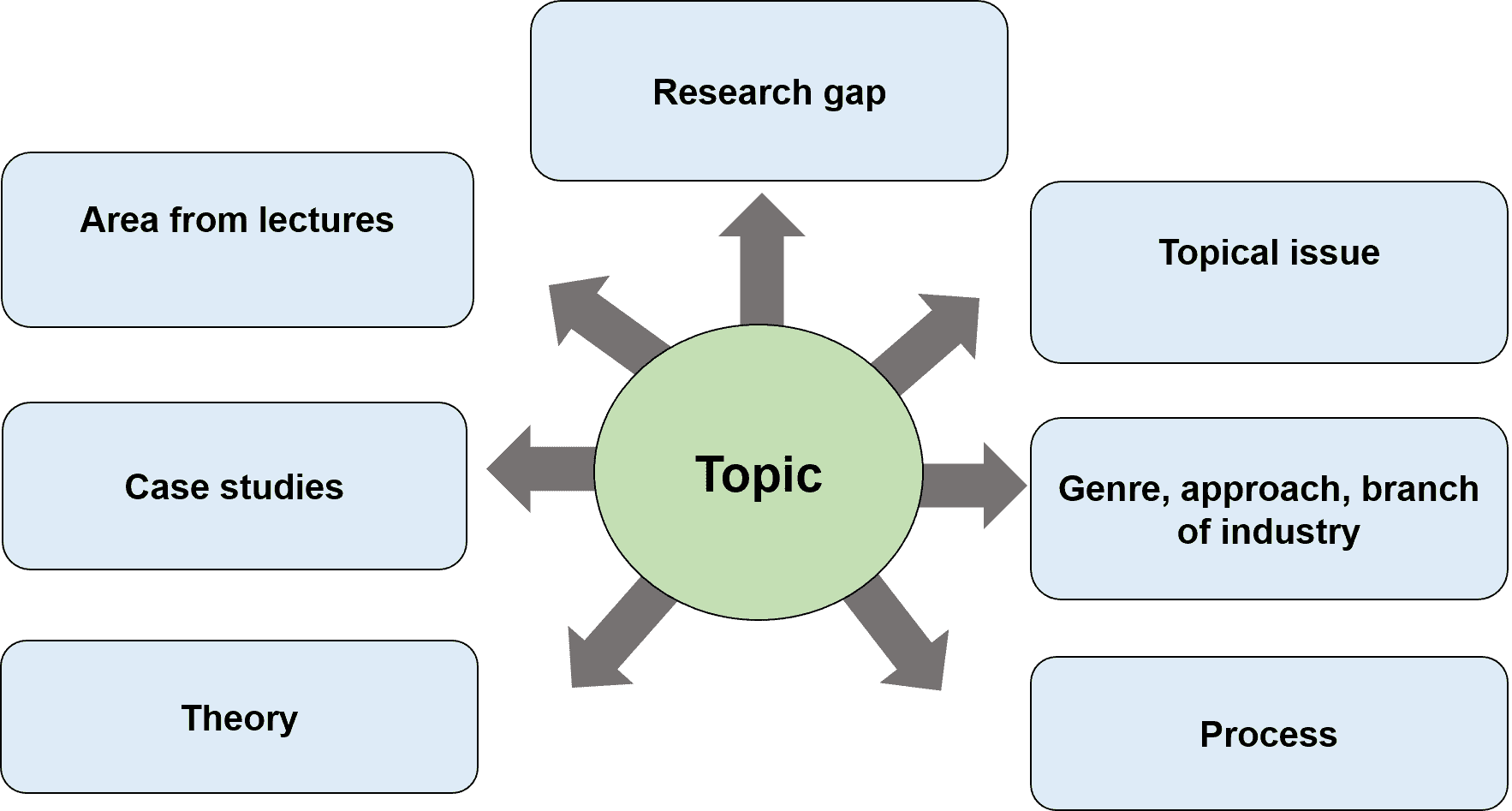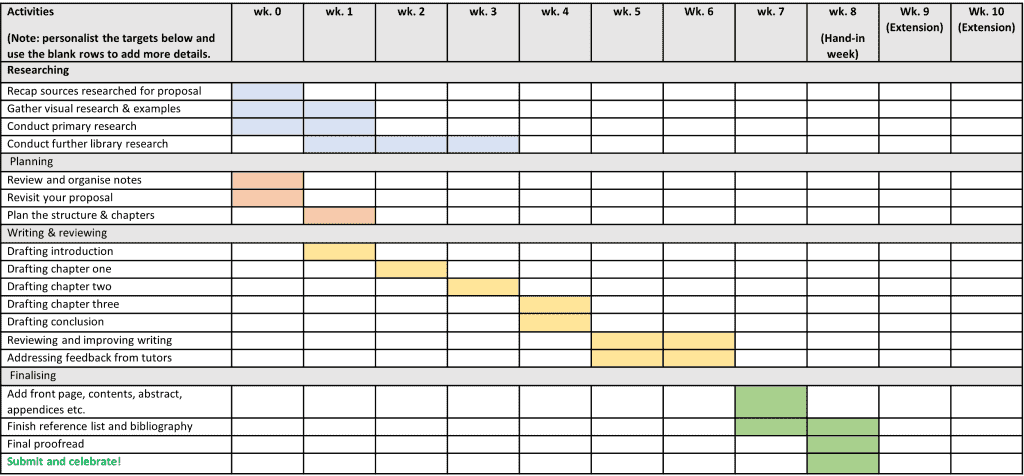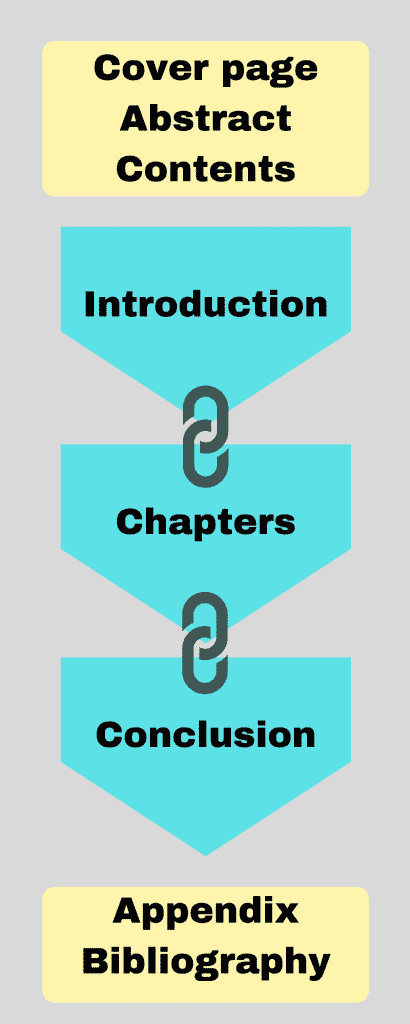3rd year research report
How do I pick a topic?
- Pick a topic based on a development within your discipline, a subject from a lecture, an area that raises debate or your experience/practice (Levin, 2011, p. 36).

- Gap: What area is missing or limited in current research?
- Topical: Which issue(s) are of concern/interest within industry?
- Genre: Which genre or branch of your discipline interests you?
- Process: Which materials or techniques do you utilise in your practice?
- Theory: Which theories or principles have you learnt about?
- Case study: Who or what inspires you?
- Past learning: What lecture topics have interested you? Do you wish to explore a previous area of research further?
Tip
Avoid picking a topic that is too wide. See ways to focus research below.
Managing your time
- It can help to break extended writing into steps.
- A weekly Gantt chart (see below) is one way of planning time.
- Plot how long each activity might take with colour coding.
- See the study skills time management pages for more tips.

Conducting primary research
- Primary research involves gathering information first-hand e.g. through visits, interviews, questionnaires or focus groups.
- You’ll need to consider whether your research topic poses any ethical risks. This applies to sensitive topics, working with vulnerable adults/young people or involving animals. Complete the Norwich University of the Arts Ethics Checklist to uncover any issues. If you answer ‘yes’ to any of the questions, you will need to complete the University’s Ethics Approval Form
- When collecting data, you’ll need to gain what’s called informed consent from your participants. This means giving the ‘full information about what it means …to take part, and … consent before they enter the research’ (Oxford University, 2020).
- There’s a dedicated page on Primary Research where you can read more about methods, writing effective questions and find templates for gaining consent.

Planning the structure
- 1. Recap the generic structure for all the report types
- Cover page: title, report type, your name, course, year of completion and word count.
- Abstract: a summary of the whole report. It covers the topic, methods and results. It is roughly 250 words in length. See the guide below.
- Introduction (up to 10 %): outline the topic of research and justify its significance. Show the reader how you will cover the topic.
- Chapters: divide up your report into chapters. Usually three will be sufficient.
- Conclusion (up to 10 %): summarize the key findings and return to your title.
- Appendix (singular) or Appendices (plural): features additional information such as email correspondence, survey questions or transcripts of interviews. Each new item takes an alphabetical letter.
- Bibliography: alphabetical Harvard referenced list of source.
2. Make a plan for the writing
- Think about each chapter.
- Summarise: What might each chapter cover overall? What questions might it seek to answer?
- Consider: Which individual paragraphs might you include? What evidence from your notes might align to each point? Use the planning template below for guidance.
- Order logically: often information follows common patterns. Which patterns from below might work for your chapters?
1. Analytical: Situation – Problem – Solution
2. Chronological: Past – Present – Future
3. Comparison: Similar – Different
4. Discussion: For – Against; Pros – Cons
5. General to specific: e.g. context or history – case studies
6. Phrased: Short – Medium – Long Term Aspects
7. Thematic: Theme a – Theme b – Theme c
Adapted from Macmillan and Weyers (2007, p. 96)
Further resources
- Follow the Library’s up to date guidance on images.
- Also look at the Research Report Guidelines on your VLE to see all the up-to-date information on structure and formatting.
- Visit the interactive VLE course on third year reports (this link opens in a new window).
- Access past workshops about preparing for the report (this link opens in a new window).
Sources consulted
- Arksey, H. and Knight, P. (1999) Interviewing for social scientists. London: SAGE.
- Gillet, A. (2019) Understanding the task. Available at: www.uefap.net/preparing/preparing-task/preparing-understanding-the-task-introduction (Accessed: 10 June 2019).
- Levin, P. (2011) Excellent Dissertations! Maidenhead: McGraw-Hill Education.
- Oxford University (2020) Informed consent. Available at: https://researchsupport.admin.ox.ac.uk/governance/ethics/resources/consent (this link opens in a new window) (Accessed: 28 July 2020).
- Macmillan, K. and Weyers, J. (2007) How to write dissertations and project reports. London: Pearson Education.
- Oxford University (no date) Informed consent. Available at: https://researchsupport.admin.ox.ac.uk/governance/ethics/resources/consent (Accessed: 16 June 2020).
- Wiles, R. (2013) What are qualitative research ethics? London: Bloomsbury group.

eBooks:
Find our more about research and dissertations here: https://tinyurl.com/yx3s3cwf
